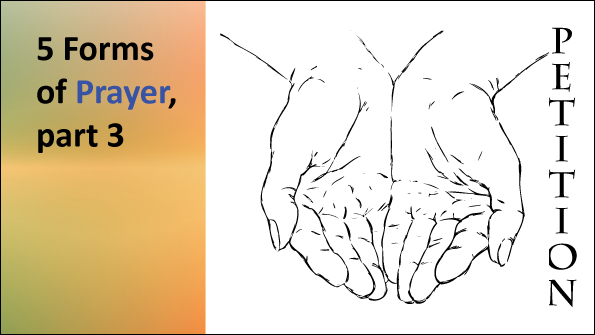By Tyson Thorne

In the 17th chapter of the gospel of John we find Jesus praying in the garden shortly before his arrest, trial and crucifixion. This is the last time he will be with his disciples, and he takes the opportunity to petition the Father on their behalf. Take a moment to read through the passage, and notice how specific he is.
Jesus prays for their protection, their unity, their joy and sanctity. If we were studying this prayer we would want to break down each of these requests, perform a word study and discover the fullness of what Jesus intended for his followers, and it would make a fine sermon. Unfortunately our goal herein is of a different nature. It is to discover how to petition God, and in this we find our first lesson: be specific.
Seeing the road ahead, Jesus knew what his disciples would face. He prayed specifically for those things that would make them successful in their calling. He left nothing of importance out, trusting that if his request were granted, the rest would accompany it.
Our prayers for others should be as well constructed. When we pray for healing, for employment, for financial assistance, for our marriage or families, we too should be specific in our requests – not as to the how but as to the end result. Is it important for the cancer victim to be healed by God or by modern medicine? What does it matter so long as the person is healed? Does it matter if one receives a job in their chosen field? Or is it important that the needs of the person and their family is met? We should be open to God’s decision about how best to answer our petition, and be open to all acceptable solution.
This is not to say that we cannot include other requests as a part of our petition, only that we ought to remain open to God’s answer. This is leaving open the possibility of God’s will overriding our own. We may pray for our spouse’s promotion at work as a possible solution to helping the family financially, but in reality what we want is financial help, not the promotion. The answer God provides may be a position at another company. We ought to accept the answer God provides even if it isn’t what we specifically asked for.
I understand this is in opposition to modern teachings of “name it and claim it.” It is intended to be. “Naming and claiming” anything perverts the petition by placing our will over and above God’s. Instead of praying for a specific solution, pray in all humility for the root problem instead.
Secondly, we should note that there is no reluctance to bring these requests to the Father. While we are to always approach the Father in humility, asking for his will (and not ours) to be done, we are to do so without reluctance. Certainly we want to pray in line with God’s desires, God himself wants to know our desires as well. There in the Garden Jesus asked that the cup of crucifixion be taken from him – in other words he wanted a different method to the solution of man’s salvation – but was humble enough to submit to God’s choice. When making this request, he did so with specificity and passion. God wants us to unburden ourselves to him; he wants us to be honest in our requests both mentally and emotionally for this builds connection between the two of you.
Finally, we should do so frequently. I know some believers think that a single request to God is sufficient, after all God hears every one of our prayers. Does God need reminding? Certainly not. Does God not understand the importance of our petitions? Of course he does. Yet again the prayer of petition is to unburden ourselves and uncover our desires to him, and for him. In this regard there cannot be too much prayer, only too little.
Jesus tells a parable about a widow seeking justice. We do not know what wrong was committed against her, only that she considered it important. How do we know it was important to her? Because she repeatedly sought justice from a local magistrate. In Luke 18.1-8 we see that even the godless judge eventually granted the widows request so that she would stop coming to him to plead her case. Jesus asks, “Won’t God give justice to his chosen ones, who cry out to him day and night?” Likewise, the children of Abraham were only released from Egyptian slavery after the repeated cries of Israel had reached God’s ears. If it is important to us, we will make every effort, and many attempts, to connect with God and pour out our heart to him.
This is the nature of petitions then: to humbly, passionately and frequently submit our requests to God, and submitting to however and whenever he wishes to answer them.
Click for part four: http://www.think-biblically.com/8-blog/20-5-forms-of-prayer-pt-4
|
|
|
